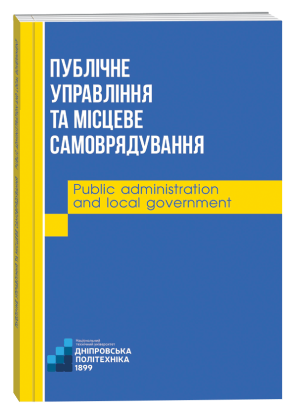FEATURES OF THE FORMATION OF THE NATIONAL PUBLIC ADMINISTRATIVE MECHANISM OF LAW ENFORCEMENT IN MODERN CONDITIONS
DOI:
https://doi.org/10.32782/2414-4436/2023-4-3Keywords:
decentralization, law and order mechanism, law and order, public management activity, public management, reformAbstract
The article substantiates the expediency of forming a national mechanism for ensuring law and order in modern conditions in the context of a change in the public management paradigm of management, the legal regime of martial law, and decentralization of management. Goal. This article aims to analyse the development of the national public management mechanism for ensuring law and order in the domestic science of public administration. Research into the possibility of modern public administration to form mechanisms for ensuring law and order in conditions of systemic challenges is an urgent need of the science of public administration. Topicality. The expediency of forming a national mechanism for ensuring law and order in modern conditions in the context of a change in the public management paradigm The relevance of the formation of a national mechanism for ensuring law and order in modern conditions is determined by a number of factors: first, the peculiarities of ensuring law and order in the conditions of the legal regime of martial law. Secondly, changes in the nature of crime, because the level of organized crime, cybercrime, crimes related to trafficking in people, weapons, drugs, as well as crimes against the environment is increasing. Thirdly, the influence of globalization in the context of the transnational nature of crime, which requires strengthening of international cooperation in this area. Fourthly, by strengthening the informatization of society, and accordingly – the growth of the role of information technologies in people's lives, which opens up new opportunities for criminals, but at the same time creates new tools to fight them. Fifth, a change in the public management paradigm, since there is a transition from an authoritarian to a democratic model of management, which requires new approaches to ensuring law and order, as well as strengthening the processes of decentralization of power, which is formalized in new forms and methods of law enforcement activity. The results. Features of the development of rational mechanisms in modern public administration actualized the expediency of introducing fundamentally new determinants that determine the essence of the national mechanism for ensuring law and order. In particular, this mechanism should be based on the following principles: 1) unity (coordination and integration); 2) comprehensiveness (covering all aspects of law enforcement); 3) preventive focus; 4) involvement of the public; 5) constancy of characteristics under conditions of external influence. The concept of the national mechanism for ensuring law and order should be formed as a system of state bodies, institutions and means that interact with each other and are aimed at preventing crime and other offenses as a set of measures aimed at eliminating the causes and conditions that contribute to the occurrence of crime, as well as at increasing the legal awareness of citizens ; protection of human and citizen rights and freedoms, investigation and disclosure of offenses, prosecution of the guilty. It is worth talking about the formation of a national management mechanism of a special type, which is flexible and adaptable to the changing conditions of society, which is constantly updated and improved taking into account new challenges and threats. The advantages of a rationally organized national mechanism for ensuring law and order (NMELO) are the possibility of transition to a new type of management relations based on the principles of a democratic society. Conclusions. In the modern world, which is dynamically changing, the issue of ensuring law and order is becoming more and more urgent. This is due to a number of factors, such as: real and hybrid methods of aggression of individual states against other states; the growth of relations between the countries of the world and the growth of transnational crime, terrorism and other threats; the development of new technologies, which creates new opportunities for criminals, and also requires new methods of fighting crime; socio-economic changes manifested in the growth of inequality, unemployment and other social problems. In these conditions, traditional approaches to ensuring law and order are becoming less and less effective. New, more complex and innovative approaches to crisis situations in management are needed, which preserve the stability of the system, are based on public trust, function on the basis of modern principles of effective management, and correspond to European traditions of open management.
References
Баштанник В., Кудрявцева М. Реформа децентралізації як сучасний концепт державотворення. Державне управління та місцеве самоврядування : зб. наук. пр. 2020. Вип. 2 (42). С. 17–24.
Руденко О. Соціальна складова суспільної стабільності: концептуальний підхід до визначення проблеми. Державне управління та місцеве самоврядування : наук. вісн. Акад. муніцип. упр. Київ : 2008. Вип. 4 (6). С. 87–99.
Ангелов Ю. Особливі умови сучасного державотворення: зміст та принципи. Державне управління та місцеве самоврядування. 2015. Вип. 3. С. 14–24.






